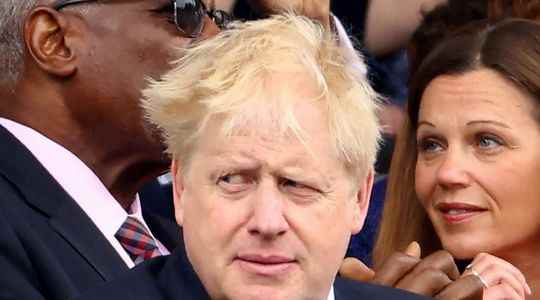His future was in the balance this Monday, June 6, hanging on a perilous vote of confidence. But Boris Johnson managed to save his head, narrowly. According to the results of the ballot, known in the evening, the British Prime Minister obtained 211 votes from Conservative MPs in his favor against 148 asking for his departure in a secret ballot, which allows him to remain leader of the party and to save his post as head of government.
A little earlier, deputies and ministers had succeeded in a room in the Palace of Westminster to vote, behind closed doors and by secret ballot. To remain in office, Boris Johnson, who has always refused to resign, had to obtain the confidence of the majority of the 359 Tory deputies, or 180 votes.
Two and a half years after his triumphant victory at the polls, the 57-year-old leader, increasingly weakened and contested, was caught up in the “Party gate” affair, the parties in Downing Street during the confinements, relaunched at the end of May with a devastating report detailing violations of the rules enacted in the face of Covid-19.
Events rushed this Monday morning, barely closed the festive parenthesis of the celebrations of the 70 years of reign of Elizabeth II. The chairman of the Conservative Party’s 1922 committee, Graham Brady, announced that the necessary threshold of 54 letters from MPs, or 15% of the parliamentary group, calling for the departure of Boris Johnson had been reached.
60% of Britons wanted the Tories to oust him
Pleading his cause in front of his troops, Boris Johnson said he was “happy” that the vote was taking place on Monday: “If you give me your support this (Monday) evening, we have a chance to stop talking about us- themselves and start talking exclusively about what we are doing for the people of this country,” he said, according to a Conservative Party official. He dangled tax cuts and staff cuts in the administration, measures capable of seducing his majority.
More than 150 elected officials had given him their support during the day and his most loyal ministers had spent the day defending him on television. But after former minister Jeremy Hunt, seen as a possible successor, Tory leader in Scotland Douglas Ross announced he would vote against Boris Johnson, citing public “anger” over breaches of Covid rules. According to a poll published on Monday by YouGov, 60% of Britons wanted the Conservatives to oust their leader – but only 32% of majority voters.
Despite the accumulation of scandals and the anger of the public and his majority, Boris Johnson has maintained himself in recent months by highlighting in particular his leading role in the Western response to the Russian invasion of Ukraine. He was also helped by the lack of a clear successor in the ranks of the Conservatives, who have been in power for 12 years in the UK, especially since the star of Finance Minister Rishi Sunak, long a darling of the party, abruptly tarnished due to his wealth and his wife’s tax arrangements in times of rising cost of living.
An authority that could be considerably diminished
But Boris Johnson’s slump in popularity has already inflicted heavy setbacks on the Tories in a local election in early May. The majority doubts more and more of the capacity of “BoJo”, booed by the crowd during the celebrations of the jubilee of the queen, to win the legislative elections of 2024.
In addition to the calls for resignation announced in dribs and drabs since the publication of the administrative report on the “Party gate” at the end of May, MP John Penrose, in charge of the fight against corruption with Boris Johnson, resigned on Monday and invited the Prime Minister to do the same, believing that he had broken the ministerial code.
Another investigation into the “Party gate” is also planned, this one parliamentary. If the latter concludes that Boris Johnson misled the House of Commons by claiming not to have broken the rules, he is supposed to resign.
Even if he won the vote on Monday evening, his authority risks coming out of it considerably reduced. The problems will therefore not be over for Boris Johnson. At the end of 2018, Theresa May had survived a motion of no confidence before resigning a few months later, too weak.
